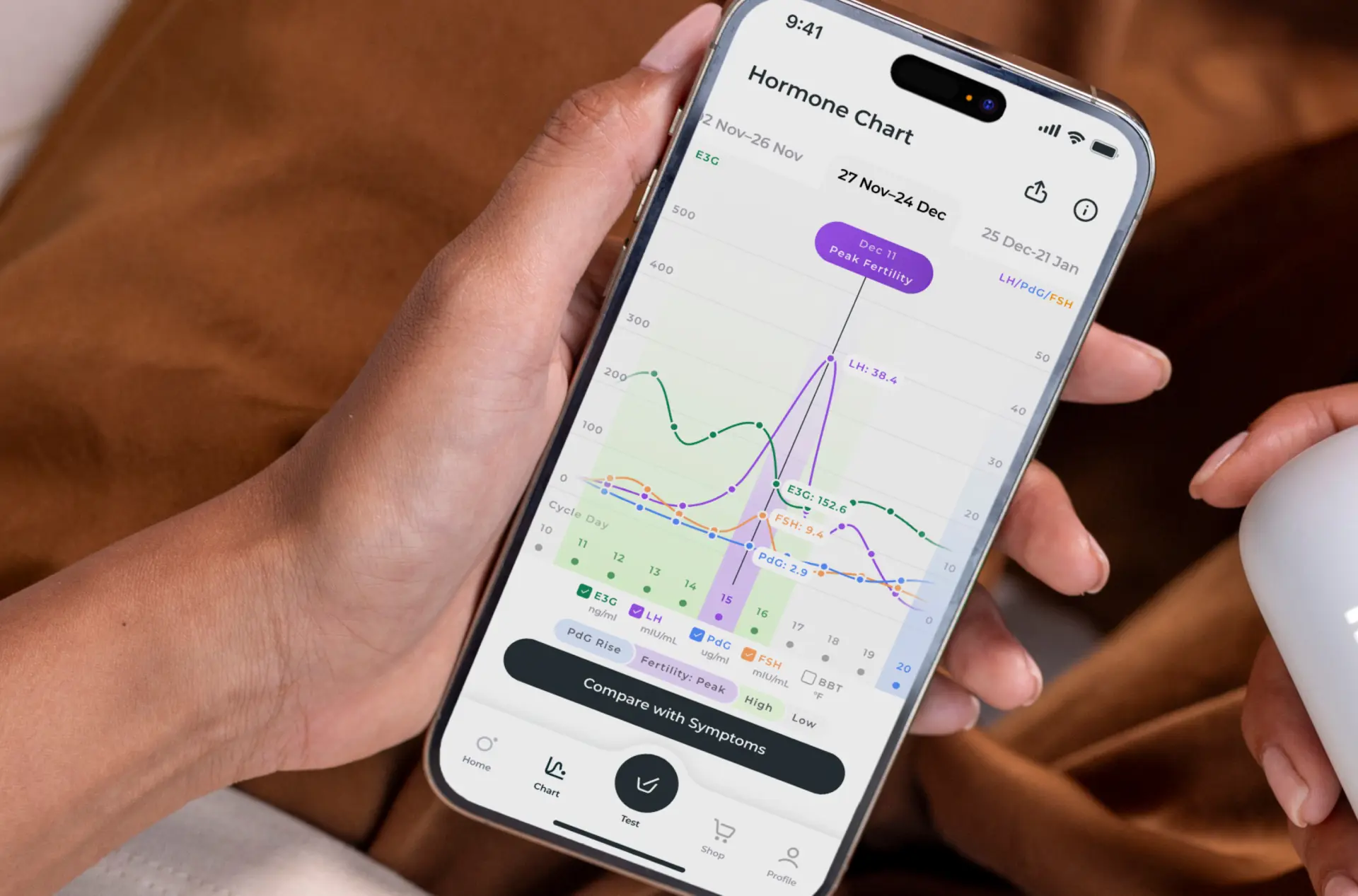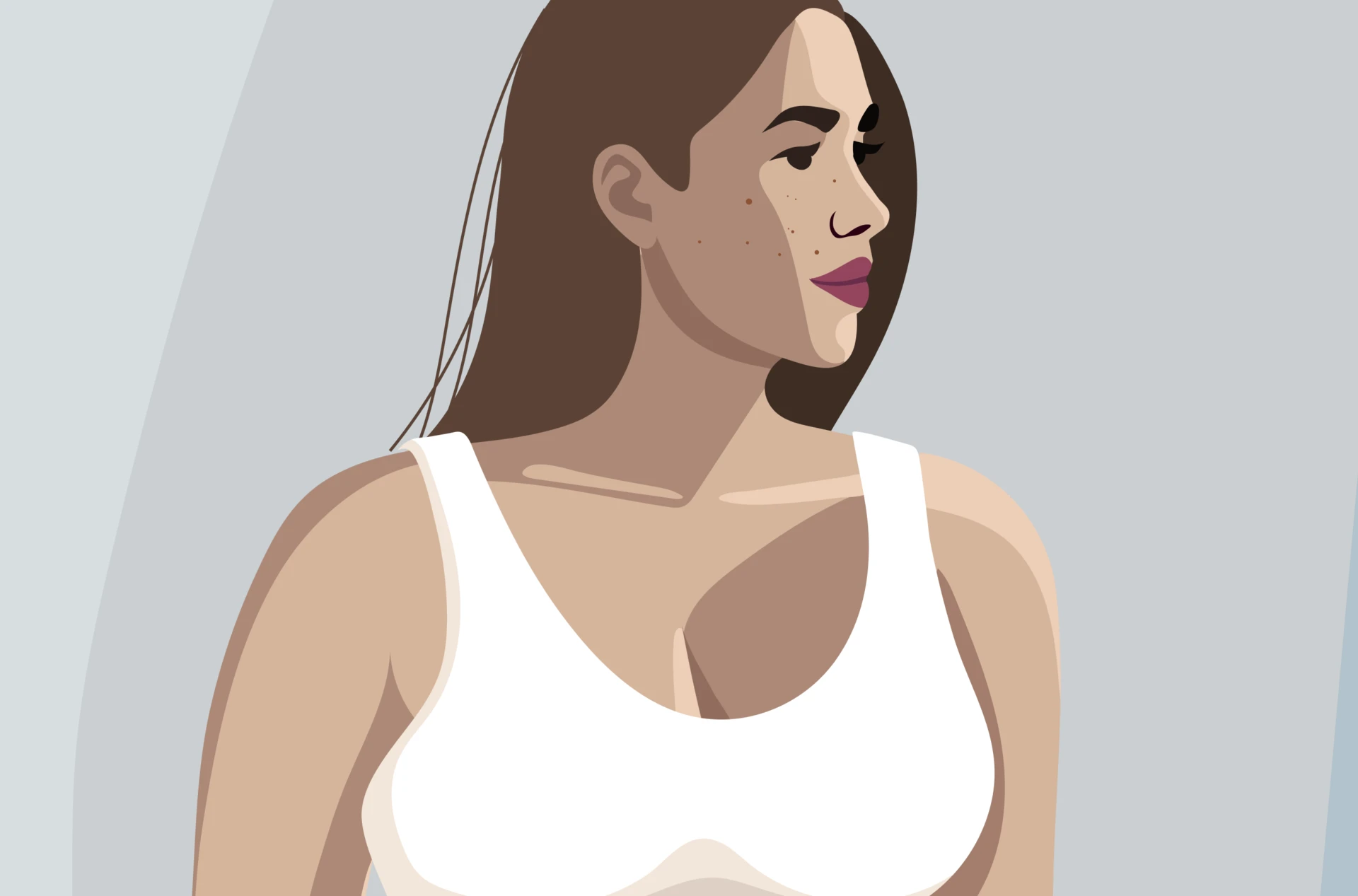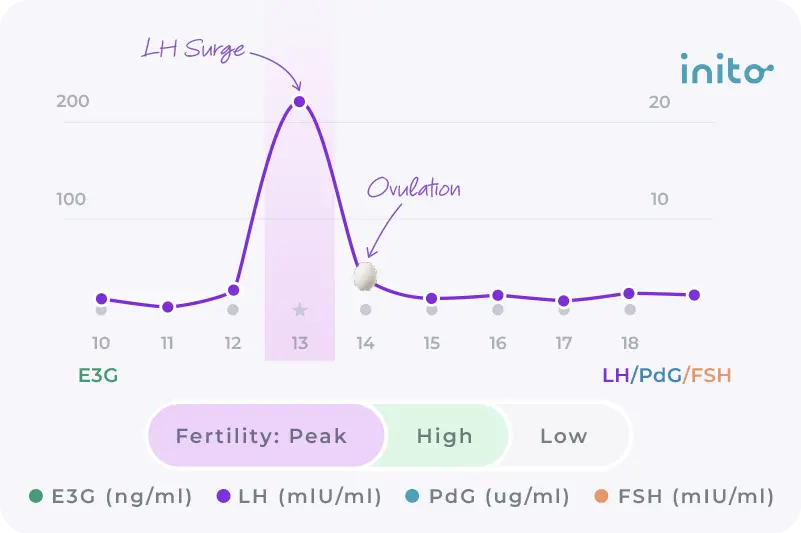Content table
Period symptoms (a.k.a. PMS or premenstrual syndrome) occur in nearly 50% of women worldwide and range in severity from mild and manageable headaches to cramps so bad you wish you didn’t have ovaries (oh, the PMS drama, too).
“PMS” encompasses a lot of different symptoms that show up during the latter half of your luteal phase and stick around through your menstruation.
But what if your PMS symptoms are flaring up, but Aunt Flo is a no-show?
You may immediately think you’re pregnant, but the truth is that pregnancy is only one of the reasons you may be having PMS symptoms sans the period.
That’s why we are going to dive into some reasons why you may be getting period symptoms but no period when not pregnant.
Key Takeaways
- Period symptoms are experienced by 50% of women worldwide.
- Physical PMS symptoms include breast tenderness, bloating, cramping, and headaches.
- Emotional/mental PMS symptoms include irritability, mood swings, sleep issues, and anxiety.
- The cause of period symptoms is still not fully understood, but theories suggest it may be due to hormonal changes, neurotransmitter imbalances, genetics, or a vitamin B12 deficiency.
- There are many reasons you may have period symptoms but no period, including pregnancy, ectopic pregnancy, miscarriage, birth control, endometriosis, PCOS, uterine polyps, PID, thyroid disorder, weight change, stress, GI issues, IC, and more.
- Be sure to track your cycles so you know when things are off.
- See a doctor if the symptoms are severe and/or have been ongoing for a prolonged period. If you are experiencing severe pain, frequent pain, pain during pooping and/or urination, low blood pressure, fainting, or missed periods, take that as a sign to see your doctor.
What Are Period Symptoms?
Period symptoms are signs that indicate your menstrual cycle is about to begin.
Studies show that 20% of women experience such intense PMS symptoms that it throws a wrench in daily life, whereas 80% of PMS sufferers find their symptoms to be less-than-ideal but more manageable.
First, let’s talk about PMS symptoms. These can take on a lot of different forms:
- Swollen or tender breasts
- Constipation or diarrhea
- Cramping
- Headache
- Backache
- Acne
- Fatigue
- Sleep problems
- Anxiety
- Mood swings
- Depression
- Low libido
What Are the Causes of PMS?
While the exact cause of PMS is not yet known, several theories exist.
One is due to the hormonal changes you experience during your menstrual cycle, particularly those related to estrogen and progesterone. The balance between these two hormones is a delicate one, and if it’s slightly off, you may experience PMS.
Another theory suggests that a shift in neurotransmitters, such as serotonin and endorphins, results from changes in hormone levels. Studies show this may be more likely for women who have a serotonin deficiency. .
Genetics is also a possible reason for PMS, as shown in a study with monozygotic (identical) vs. dizygotic (fraternal) twins.
Vitamin B12 deficiency may also contribute to your PMS. This vitamin is essential for replenishing blood during your period, and if you’re deficient, it can contribute to PMS symptoms.
Why Am I Having Period Symptoms but Not Getting My Period?
While the exact cause of PMS is not yet known, several theories exist.
One is due to the hormonal changes you experience during your menstrual cycle, particularly those related to estrogen and progesterone. The balance between these two hormones is a delicate one, and if it’s slightly off, you may experience PMS.
Another theory suggests that a shift in neurotransmitters, such as serotonin and endorphins, results from changes in hormone levels. Studies show this may be more likely for women who have a serotonin deficiency.
Genetics is also a possible reason for PMS, as shown in a study with monozygotic (identical) vs. dizygotic (fraternal) twins.
Vitamin B12 deficiency may also contribute to your PMS. This vitamin is essential for replenishing blood during your period, and if you’re deficient, it can contribute to PMS symptoms.
Why am I having period symptoms but not getting my period?
Pregnancy
The first (and most obvious) possibility is pregnancy. The symptoms of PMS are eerily similar to the signs of pregnancy, and they include:
- Breast tenderness
- Headaches
- Fatigue
- Cramping
- Nausea
These things occur because your body has just been flooded with hormones, and it’s struggling to sort things out.
A pregnancy test can be your bestie, but wait until the day after your expected period to take it for the most accurate results. If the results are negative, wait until one week after your missed period to take the test again.
Ectopic pregnancy
An ectopic or extrauterine pregnancy occurs when the embryo implants outside of the uterus, which makes it a non-viable pregnancy. The fetus can’t grow properly anywhere except the womb, and it can be potentially dangerous.
An ectopic pregnancy can often be mistaken for a regular pregnancy and/or PMS, as the symptoms are similar and include a missed period, tender breasts, nausea, back pain, cramping, and more.
This is because an ectopic pregnancy will still produce pregnancy hormones, which can cause period symptoms.
Other symptoms include irregular vaginal bleeding, abdominal pain, shoulder pain, dizziness, and more. If you experience any of these, see your doctor ASAP.
Miscarriage
We wish no one knew the experience of a miscarriage, but it is an unfortunate reality for some. This happens when there is a loss of pregnancy before 20 weeks and it is most often due to chromosomal abnormalities.
Miscarriages can cause a major shift in your hormones that manifests as a drop in your estrogen and progesterone, which leads to symptoms that look like period symptoms.
Notable miscarriage symptoms include vaginal bleeding, pelvic pain or cramping, and the passing of vaginal fluid or tissue. If you think you’re having a miscarriage, call your healthcare provider immediately.
Birth control
Whether it’s the pill, an IUD, or any other form of hormonal birth control, your body will take some time to adjust when you first start. This means you may miss your period, but you will still experience those familiar period symptoms.
And some studies find that even after that adjustment period, the pill still gives women period symptoms. But this isn’t the case for all women, as some report their PMS symptoms alleviated with the use of birth control.
If you’ve been using a form of hormonal birth control for an extended period of time (we are talking years), then you may find that it starts to cause issues with your period, which can lead to period symptoms without the period.
Taking time off birth control and switching birth control methods can affect your hormones.
Endometriosis
The extra tissue that forms outside of the uterus with endometriosis can cause serious inflammation flares and pelvic pain.
Many women mistake this pain for period pain, but for 10% of women worldwide, it is endometriosis.
Estrogen is high with this condition, which throws off the estrogen-progesterone balance, leading to the potential of PMS sans the accompanying period.
Know more: Uncommon Symptoms of Endometriosis: Hidden Clues
Polycystic ovary syndrome (PCOS)
This hormonal disorder is defined by the fact that it causes you to skip ovulation.
Both men and women have androgen hormones, though women’s levels are lower. However, that is not the case with PCOS.
Women with PCOS have a lot of androgen hormones, which can throw other hormones out of whack. This also includes a raised LH:FSH ratio and higher insulin levels as well.
Uterine polyps
Uterine polyps are also called endometrial polyps and happen when the lining of the uterus (endometrium) overgrows. They typically happen during or post-menopause, though there are pre-menopausal cases, too.
These polyps can form due to a hormone imbalance, which may also manifest as period symptoms.
Pelvic inflammatory disease (PID)
This disease happens when vaginal bacteria move to the uterus, ovaries, or fallopian tubes, which can lead to an abscess. STIs are the main cause of this, and PID’s symptoms look much like PMS symptoms: Lower back pain, fever, nausea, and more.
Studies show that PID can drop your estrogen levels, which, as you can imagine, does not look good for your PMS-like symptoms.
Thyroid disorders
The thyroid gland regulates a lot of your metabolic and hormonal functions, including your menstrual cycle. However, some disorders can turn those functions upside-down.
Hypothyroidism is when the thyroid doesn’t produce enough thyroid hormone. Hyperthyroidism occurs when the thyroid gland produces excessive amounts of hormone.
The symptoms of both are easy to mistake for PMS and include anxiety, sleep problems, fatigue, etc.
Weight changes
Did you know that your weight can affect your hormones and, thus, your period?
An irregular or totally MIA period can be linked to a BMI that’s outside the normal range.
Studies show that women with a 25+ BMI can have high estrogen and androgen levels due to the increase in fat cells.
Other research shows that women with a BMI lower than 18 may not produce enough estrogen due to a decrease in fat cells.
Both ends of this spectrum may lead to irregular menstrual cycles, which can look like PMS minus the period.
Stress
Stress. The thing that shows up uninvited at the worst possible times.
The big S can cause fatigue, irritability, and leave you with physical symptoms such as headaches, aches, diarrhea, changes in appetite, and more.
Sounds eerily similar to PMS, doesn’t it?
The two are linked, and stress can actually cause you to skip your period entirely (but not the symptoms, of course). That’s because stress does a number on your hormones and throws your whole homeostasis off.
Irritable bowel syndrome (IBS) & other GI issues
IBS and other gastrointestinal issues can make everyday life extremely uncomfortable.
These conditions can cause cramping, bloating, gas, diarrhea, and constipation – just like you may experience with period symptoms.
It’s easy to think your IBS symptoms are your period, and it actually makes sense. That’s because your gut has receptor cells for estrogen and progesterone, so shifts in these hormones can affect your gut function.
Studies show that too much harmful gut bacteria (a.k.a. dysbiosis) can increase estrogen levels, which can lead to issues ranging from period pain to endometriosis.
Interstitial cystitis (IC)
This chronic neuroinflammatory disorder causes bladder and pelvic pain as well as a slew of issues with the bladder.
Studies show that estrogen impacts inflammation, so it’s possible that when your hormone levels are off, you may be more susceptible to IC.
When to See a Doctor?
Sometimes, your period symptoms are a sign that your period is on its way.
But as you can see from above, that’s not always the case.
So, how do you know when you should see a doctor?
Here are some things to consider:
- Intensity. How severe is the pain or cramp?
- Frequency. How often are you experiencing the symptoms?
- Associated symptoms. Do you have any other complaints along with period cramps?
- Last period date. When was your last period date? When are you due for the next?
Severe pain is not normal. It could mean a miscarriage, ectopic pregnancy, or endometriosis.
Frequent pain is also not normal and could be a marker of endometriosis.
If you experience other symptoms such as pain during pooping or urination, low blood pressure, fainting, or missed periods, it’s a sign that something is amiss in your body, and you need to see a doctor.
Your doctor will prescribe one or more tests, depending on the suspected condition.
For example, if the doctor suspects an ectopic pregnancy or a miscarriage, they will order a blood test and a USG. If a uterine polyp is suspected, they will request a hysteroscopy to examine the uterus and cervix. There is a corresponding test for each potential underlying condition that will allow your doctor to gather further information before making any kind of diagnosis.

FAQs
So you’ve got all the symptoms, but Aunt Flo is nowhere to be seen.
This could be happening for a few different reasons:
- Pregnancy
- Ectopic pregnancy
- Miscarriage
- Birth control
- Endometriosis
- PCOS
- Uterine polyps
- PID
- Thyroid disorder
- Weight change
- Stress
- GI issues
- IC
It’s best to consult your doctor for a better idea of what may be going on in your body to cause the period symptoms but no period.
There’s no black-and-white answer to this one. It’s normal to experience variations in your period by up to 6 days. Additionally, if you have any of the above situations going on in your body, then you may have the symptoms, but your period may not come.
If you’re experiencing period symptoms but your period isn’t showing up for more than 3 months, schedule an appointment with your doctor to run some tests and see what may be going on.
Absolutely! If you have your period without symptoms, this is normal. Honestly, you should consider yourself lucky! Your period without the pain isn’t so bad, is it? Some women experience symptoms and others get off without anything – both are normal (as long as your period pain isn’t severe).
You may be surprised to hear that 69% of women have cycles that vary by up to 6 days, and this is totally normal! Be on the lookout for the usual period symptoms because chances are good your period is right around the corner.
But, if you start experiencing abnormal symptoms such as severe pain, vomiting, fainting, and passing of tissue-like clots, this is not normal and means you need to consult your doctor ASAP.
PMS and early pregnancy symptoms are similar, and you have your fluctuating progesterone levels to thank for that. Both situations cause your progesterone levels to shift, which can look like the same symptoms. That’s why it can be easy to confuse PMS and pregnancy.
If you think you’re pregnant, wait until the first day after your expected period to take a pregnancy test. If the test is negative but your period is still MIA, and you feel like you may be pregnant, wait for one week after your expected period to take another pregnancy test.
If that test is negative but you’re still feeling period symptoms without the period, it could be other conditions such as birth control, endometriosis, PCOS, weight change, stress, GI issues, thyroid disorder, or more.
Check with your doctor to learn more.
Exact signs that your period is coming can vary from woman to woman and sometimes from cycle to cycle, too. But some common signs that your period is coming include:
- Sore breasts
- Stomach issues like diarrhea or constipation
- Feeling crampy
- Headaches and backaches
- Extra tiredness or trouble sleeping
- Increased anxiety, depression, and mood swings
- Lower sex drive
It can help to keep track of your premenstrual symptoms each month with an app so you can know what’s normal for you.
Some common period symptoms include: cramping, headaches, fatigue, constipation, and breast tenderness. When your period officially begins, you’ll also have light or heavy vaginal bleeding. It’s important to realize, though, that the exact symptoms may vary from one woman to the next.
Period symptoms can show up anywhere from several days up to 2 weeks before your period actually arrives. These symptoms occur due to hormonal changes post-ovulation, specifically due to fluctuating progesterone and estrogen levels.
A stress period can look like irregular, early, delayed, missed, lighter or heavier periods. High stress levels can lead to increased cortisol levels, which can interfere with the hypothalamus-pituitary-ovarian axis and disrupt ovulation.
Rare symptoms of periods to watch out for are:
- Extremely heavy bleeding that interferes with daily life
- Extreme mood changes or suicidal thoughts
- Extreme fatigue
- Feeling dizzy or like you’re going to faint
- Shortness of breath
- Leg pain or vision changes
Some of these symptoms could point to premenstrual dysphoric disorder (PMDD), a more intense version of PMS that impacts your ability to function in daily life.
There are a few scenarios that could be mistaken as a period. These include –
- Ovulation bleeding
- Implantation bleeding
- Hormonal fluctuations
- Ectopic pregnancy
- Miscarriage
- Conditions that can cause irregular bleeding such as PCOS, thyroid issues, uterine fibroids, polyps, STIs
During your period, a few things you should avoid are:
- Situations that may cause you unnecessary stress (since you’re more prone to mood swings during this time)
- Not getting adequate sleep (since PMS can cause fatigue)
- Eating foods that may worsen your symptoms like bloating, constipation, and diarrhea
- Alcohol, smoking or excessive caffeine since it can worsen bloating and mood changes
- Excessive exercise (if it feels stressful or unnatural)
The weird feeling before your period is known as premenstrual syndrome, aka PMS. PMS symptoms may be slightly different for every woman. But it encompasses a period of about 1 – 2 weeks where you experience physical and emotional symptoms caused by your fluctuating hormones. These symptoms usually subside once you get your period.
Was this article helpful?
- Premenstrual Syndrome | NIH
- The Role of Hormones and Hormonal Treatments in Premenstrual Syndrome | Springer Link
- Premenstrual Syndrome | American Family Physician
- Longitudinal population-based twin study of retrospectively reported premenstrual symptoms and lifetime major depression | NIH
- Pregnancy Symptoms You Can’t Miss At 13 DPO | Inito
- Symptoms of pregnancy: What happens first | Mayo Clinic
- Ectopic Pregnancy | ACOG
- Ectopic Pregnancy | Beaumont
- Effects of early pregnancy loss on hormone levels in the subsequent menstrual cycle | NIH
- Oral contraceptive use and premenstrual syndrome among sexually active female university students in Cameroon | NIH
- Your Guide to Getting Pregnant With Endometriosis | Inito
- Endometriosis | World Health Organization
- Estrogen Receptors and Endometriosis | NIH
- Using Ovulation Tests with PCOS: Can You Trust the Accuracy? | Inito
- Polycystic Ovary Syndrome (PCOS) | Johns Hopkins Medicine
- Uterine polyps | Mayo Clinic
- Role of Hormones in Common Benign Uterine Lesions: Endometrial Polyps, Leiomyomas, and Adenomyosis | NIH
- Pelvic Inflammatory Disease (PID) | ACOG
- The effect of inflammatory diseases associated with opportunistic urogenital infection on the hormonal function of the female reproductive system | NIH
- Reduced-calorie dietary weight loss, exercise, and sex hormones in postmenopausal women: randomized controlled trial | NIHWeight, fertility, and pregnancy | OASHStress and hormones | NIH
- The impact of the gut microbiota on the reproductive and metabolic endocrine system | NIH
- The Impact of Estrogens and Their Receptors on Immunity and Inflammation during Infection | NIH












